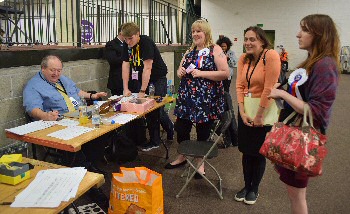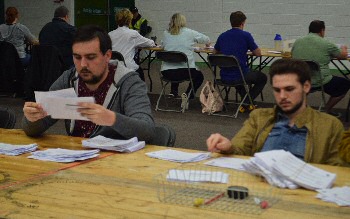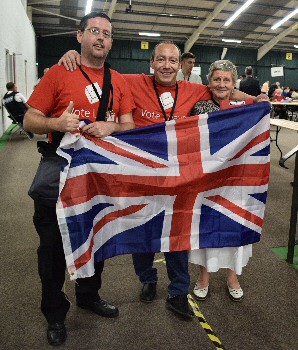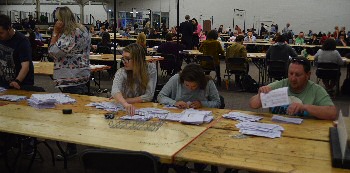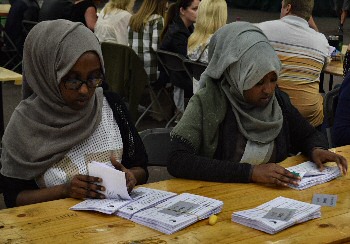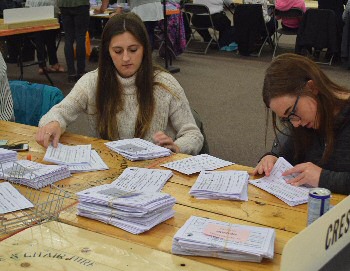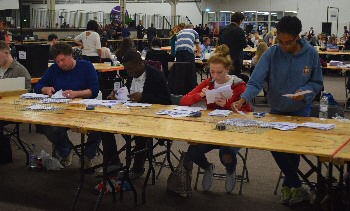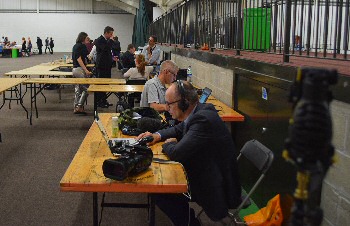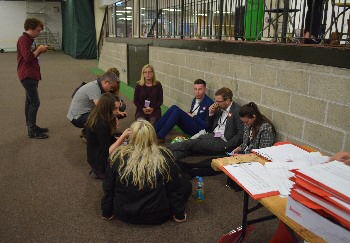 Your Online Newspaper for the Merseyside Area. |
|
| Latest Edition |
|
Archive |
|
PLEASE NOTE THAT SOME SECTIONS OF THIS PAGE ARE NO LONGER WORKING THIS PAGE IS NOW ARCHIVED FOR HISTORIC RECORD. |
|
> |
|
|
||||
|
|||||||||||||||||||||||||||||||||||||||||||||||||||||||||||||||||||||
|
Headlines and reports on this page = 1 news items. Page - 10. |
|||||||||||||||||||||||||||||||||||||||||||||||||||||||||||||||||||||
|
|
|
||||||||||||||||||||||||||||||||||||||||||||||||||||||||||||||||||||
|
EU vote lands UK into possible economic & political limbo
NO matter what you voted, the fact remains that the UK voted out of the EU. 'Leave' won the referendum with 51.9% (17,410,742 votes), while Remain finished on 48.1% (16,141,241 votes). Now we have to deal with the issues at stake. This could now lead to a very dark future for the UK, even with it splitting up. On the other had, some think it will save us and make us stronger, but for now, the problem is what to do next. Britain's momentous decision to become the 1st member state to leave the 28 member European Union has plunged the bloc into uncharted waters. It has sparked widespread concern and triggered losses on global stock markets already. With pro-'Remain' figures saying they would not:- "roll over and give up," some are urging a 2nd referendum be held, after Brexit negotiations have taken place. Also the Liberal Democrats have now promised to campaign on a platform of taking the UK back into the EU at the next general election, after Britain voted to leave the political and economic union in the 23 June Referendum (2016). But how likely we would ever be let back in, but this seems very unlikely, in our life time…
It's a mixed reaction now that the true impact is slowly revealing to those who
voted out. Yes, the EU has had many issues we all hated and often criticized,
but now many are questioning if they had voted the correct way. According to
national media and our own findings, many voters are apparently shocked
following a statement made by Nigel Farage on live TV, where he told the
presenters of 'Good Morning Britain' on the morning after, that it
was a "mistake" for the 'Leave' campaign to have
claimed there'd be £350m a week extra for the NHS after Brexit.
On Monday, 27 June 2016, as the haze started to clear, political leaders started to fall by the wayside as resignations took place and political in-fighting started. This is not what the UK needs when we are at such a dangerous crossroads. This will require very skilful leadership and a sense of common purpose. EEF, The Manufacturers' Organisation, has told the media that a crunch meeting between business groups and the Business Secretary, due to take place on Tuesday, 28 June 2016. In this meeting they are expected to tell the UK Government that the work to shore up confidence and secure our industrial future should be a priority. EEF will seek early assurances about the Government's commitment to securing access to the single market and protecting the UK's trading relationships. It will also call on the Government to send a clear 'business as usual' message to Europe and the rest of the world. At the same time, EEF will urge ministers to avoid allowing business and the UK to fall into limbo by getting on with important investment decisions, such as expanding the UK's airport capacity.
Terry Scuoler, the CEO of EEF, is also going to make it clear that the
Government has manufacturers' backing to wait until the UK has a clear and
defined negotiating position before triggering Article 50. He will also
reiterate the need to ensure that the migration of workers into the UK is not
impaired now or in any future negotiations.
Already the financial standing of the UK is now in question, after being
stripped of its last AAA, rating as credit agency Standard and Poor's warned of
the economic, fiscal and constitutional risks the country now faces as a result
of the EU referendum result. But others like TUAEU Campaign Director Enrico
Tortolano said that "Article 50 of the Lisbon Treaty should be invoked
immediately." Something the car industry and financial markets are
repeatedly saying not to do!
|
|
...Continued... Adding:- "Shockingly, a cabal of pro-EU voices are seeking to undermine the referendum decision in utter contempt of the people who voted. This should worry everyone, whatever way they voted. A rejection of the will of the people by the unelected and unrepresentative is taking place in an orchestrated challenge to our very notion of democratic accountability. During the referendum the concerns and interests of the majority of the people was continually challenged by citing 'experts'. The fact that most of these had vested interests in the EU was conveniently ignored. Now we are faced with legions of legal and other 'experts' not just telling us how stupid we were as a people to vote the way we did, but that the issue is ever so complicated and shouldn't now be implemented. Some MPs are quite happy to be elected by an intelligent electorate, but if those who elect them then disagree with them, they are dismissed as stupid. We are witnessing a fear of the democracy of the people emerging. The majority in both Houses of Parliament who disagree with the people's verdict are organising against us and their friends in unelected positions in the banks and the media and law firms are only too pleased to assist. Their actions are profoundly worrying for the rest of us. In trade union democracy at its best you debate and decide. If the decision is reached by a 50% plus 1 majority, 100% of the members implement and support the policy. As anti democratic forces mobilise to undermine the people's referendum decision, this should be seen as a good guiding principle."
With a population over median age in the United Kingdom at 40.1 years, the UK's population ageing is seen as 1 of the greatest challenges facing the UK, in the future. With a declining birth rate of UK Nationals, according to the Office of National Statistics, the worry is that we will not have enough young people to fund pension schemes and medical care very soon, unless this is addressed. One way is to use immigration to boost up the numbers of young people. This will leave the UK Government in a very problematic situation, as we become more and more xenophobic, as shown by some of the worries that have been acted on, in the referendum. This low number of births has prompted a succession of experts to warning of a 'population crisis' looming by 2025. Being in or out of the EU will not make a huge difference directly, but indirectly, this might have a very heavy impact on our retirement. Oddly, Germany is facing a worse problem, if these statistics are to be taken as fact.
According to the British Social Attitudes, almost 50% of the population believe immigration has a negative impact on the British economy. Now sadly post - EU Referendum, the nation as been hearing growing incidents of racist abuse being reported to the UK Police, nationally; partly down to a massive increase in anti immigration rhetoric used by the 'Out' campaign. One man who was filmed by Channel 4 News, in Barnsley, admitted on camera that he voted to leave in order:- "to stop Muslims coming into the EU." He then added in the TV interview that:- "It's all about immigration. It's not about trade or Europe or anything like that, it's all about immigration. It's to stop Muslims coming into this country. Simple as that!" Part of this has been flagged up by national media as an issue that was re-enforced by Farage's "morally wrong" poster, which used:- "angry nationalism" to try to win the referendum. The poster was condemned by politicians on both sides of the referendum debate, with Vote Leave's Michael Gove even saying that:- "I shuddered" when he saw the image.
With all the political back stabbing and self interest voting in the EU by both parties, should the EU nations see they had a role in this result as well? It's sadly not just the UK who feel divided, as the pressure grows. This could be the golden opportunity to re-build (If the EU stops the:- "Get out now" tone...) and also it could just well be in the long term, just what the doctor ordered for the UK.
If we go ahead with Article 50, it's ironic that on the Anniversary of the end
of the 1st World War, in 2018, the UK could see it destroyed by itself, due to
misinformation given on all sides. The mistrust and xenophobia that the UK is
feeling now must be addressed by all nations. This is a wake up call to all. The
political climate of old must be changed, as it is failing on a catastrophic
scale. Let's hope the EU Nations see this as opportunity and help the UK and not
let us fall. The UK is in its hour of need, and like any suicidal person, the
nation needs support not more rhetoric, which has led us to this situation.
Has the result unleashed a Pandora's box of financial hardships, restricted movement and opportunities for UK citizens, bigotry and Islamophobia? Is this just a passing phase that will soon charm down? What are your views? Will we leave on good standing? Was this vote a dangerous political move or a good move? Please let us know your thoughts.... News24@SouthportReporter.com...
No matter who is at fault or who vote what, we need to now work together and sort this mess we, as a nation have created. Let's put the Great back in the Great Brittan and show we are not what many Europeans appear to be seeing us as. One quote from German press said we are:- "a nation of racist, self cantered, foolish morons!" after seeing some of our comments in the media following the vote.
Fact file:- United Kingdom population is equivalent to 0.88% of the total world population.
The current population of the United Kingdom is 65,106,704 as of Monday, June
27, 2016, based on the latest United Nations estimates. So that means that it
was around 26% of the population voted to take us out of the EU. Also
interestingly just 2.27% of England is built up area. This means almost 98% of
our green and pleasant land remains that way… But shockingly, more than ½ of the
UK's food and feed now comes from overseas! This will means food prices will
likely increase as a result.
|
|||||||||||||||||||||||||||||||||||||||||||||||||||||||||||||||||||
|
A challenge to all 'In' and 'Out' campaigners now is to reunite. Please will all sides help to stop the racist abuse taking place now across the UK... No matter how you voted, this is not acceptable so 'Out' campaigners, please stress that the horrendous abuse being unleash is not what you voted for. We understand the majority of 'Out' campaigners had non-racist intentions and legitimate issues, but sadly this must be stressed to those who do not get it! | |||||||||||||||||||||||||||||||||||||||||||||||||||||||||||||||||||||
|
Help us keep this site online. Please don't brake our copyright by copying any of the text or images in this website, even if its only for 'personal use.' | |||||||||||||||||||||||||||||||||||||||||||||||||||||||||||||||||||||
|
|||||||||||||||||||||||||||||||||||||||||||||||||||||||||||||||||||||
| |||||||||||||||||||||||||||||||||||||||||||||||||||||||||||||||||||||


